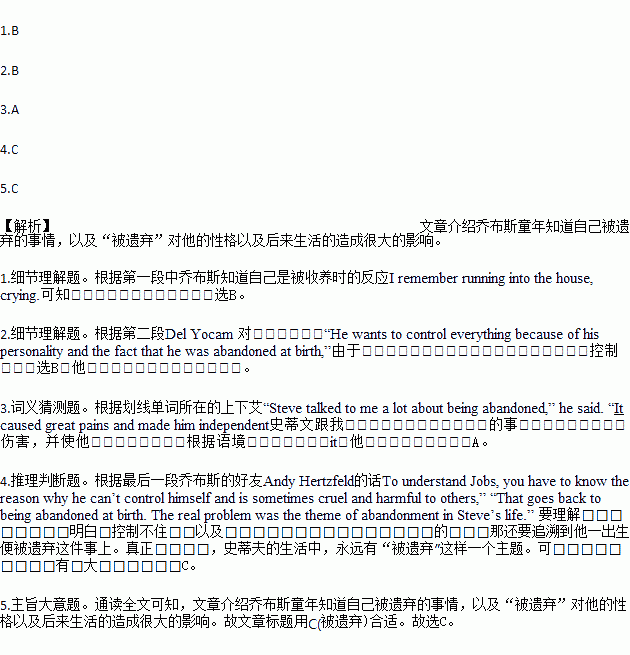题目内容
Steve Jobs knew from an early age that he was adopted (收养). “My parents were very open with me about that,” he recalled. He had a clear memory of sitting in the yard of his house, when he was six or seven years old, telling the girl who lived across the street. “Does that mean your real parents didn’t want you?” the girl asked. “My whole world was falling apart,” according to Jobs. “I remember running into the house, crying. And my parents said, ‘No, you have to understand.’ They were very serious and looked me straight in the eyes. They said, ‘We specially picked you out.’ Both of my parents said that and repeated it slowly for me. And they stressed every word in that sentence.”
Abandoned (被抛弃). Chosen. Special. These words became part of who Jobs was and how he thought of himself. His closest friends think that the knowledge that he was given up at birth left some scars (伤疤). “He wants to control everything because of his personality and the fact that he was abandoned at birth,” said one longtime colleague (同事), Del Yocam.“He wants to control his environment, and he sees his product as a part of himself.” Greg Calhoun, who became close to Jobs right after college, saw another effect. “Steve talked to me a lot about being abandoned,” he said. “It caused great pains and made him independent. He was different from others because he was born into a different world.”
Later in life, Jobs became a father and abandoned one of his children. Andy Hertzfeld, who worked with Jobs at Apple in the early 1980s, is among the few who remained close to Jobs. “To understand Jobs, you have to know the reason why he can’t control himself and is sometimes cruel and harmful to others,” he said. “That goes back to being abandoned at birth. The real problem was the theme of abandonment in Steve’s life.”
1.Which of the following is true about Jobs’ childhood?
A. He left his parents at the age of six or seven.
B. He was shocked knowing he was abandoned.
C. He couldn’t remember how he was abandoned.
D. His parents chose him because his family was poor.
2.What did Del Yocam think of Jobs?
A. He hated to be born with scars.
B. He liked to get things under control.
C. He enjoyed good working environment.
D. He wanted to influence everyone.
3.What does the underlined word “it” in the second paragraph refer to?
A. The fact that Jobs was abandoned.
B. Jobs’ pain from the abandonment.
C. Jobs’ talk with Greg Calhoun.
D. The world where Jobs lived.
4.What can be inferred from the last paragraph?
A. Jobs didn’t bring up any children.
B. Jobs had a lot of close friends.
C. Abandonment influenced Jobs.
D. Nobody likes Jobs’ character.
5.What is the best title for this text?
A. Steve Jobs B. Jobs’ Childhood
C. The Abandonment D. A Terrible Memory


 try to remember good moments to making me feel better. When I miss some friends or family member I also try to remember those happy moments we were spent together. In my opinion, the best way to help people be happy in life are to make them laugh every time we are feeling down. Also by give them love you can make them feel sure about themselves.
try to remember good moments to making me feel better. When I miss some friends or family member I also try to remember those happy moments we were spent together. In my opinion, the best way to help people be happy in life are to make them laugh every time we are feeling down. Also by give them love you can make them feel sure about themselves.